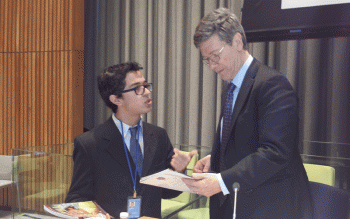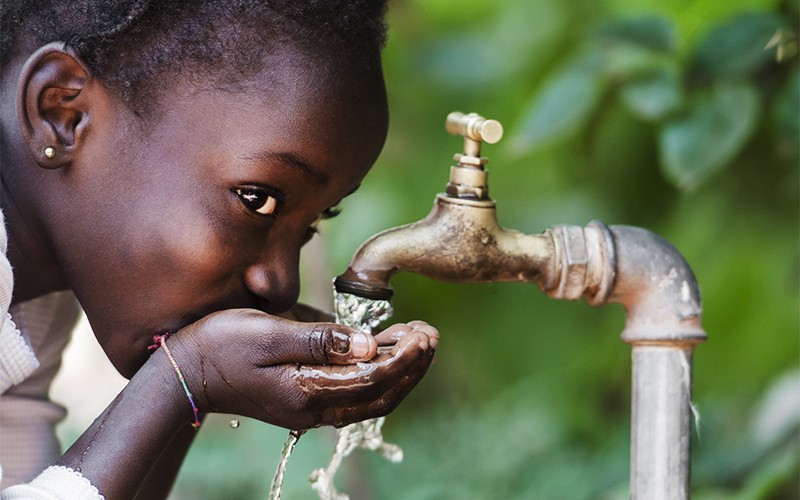World Water Day
On March 22, 1992, the United Nations published its “Universal Declaration of Water Rights”. The idea behind the text was to awaken and increase environmental awareness of populations and of those in government positions, especially as to the importance of water for human survival. In the following year, on the same date, the UN General Assembly instituted March 22 as World Water Day.

Since then there has been a growing concern as to the scarcity of water resources on the part of peoples. Some analysts are forecasting that in a not-too-distant future there will be armed conflicts against a backdrop of dispute over this extremely valuable liquid.
War for Water

NEW YORK, USA – American economist and Director of Columbia University’s Earth Institute, Jeffrey D. Sachs (R), also received the GOOD WILL Sustainable Development magazine during the conference. He is also the Special Advisor to the United Nations Secretary-General Ban Ki-moon on the Millennium Development Goals.
An article by North American Professor of Economics Jeffrey D. Sachs, published in the Valor Econômico newspaper in April 2009, reconfirms that the predictions are unfortunately coming true: “Many conflicts are caused or inflamed by water scarcity. The conflicts from Chad to Darfur, Sudan, to the Ogaden Desert in Ethiopia, to Somalia and its pirates, and across to Yemen, Iraq, Pakistan, and Afghanistan, lie in a great arc of arid lands where water scarcity is leading to failed crops, dying livestock, extreme poverty, and desperation.”
And continues the columnist: “The United Nations agency UNESCO recently issued The UN World Water Development Report 2009; the World Bank issued powerful studies on India (India's Water Economy: Bracing for a Turbulent Future) and Pakistan (Pakistan's Water Economy: Running Dry); and the Asia Society issued an overview of Asia's water crises (Asia's Next Challenge: Securing the Region's Water Future).”
Look at just how far we have gone. We must put a halt to this urgently. Sachs says that “these reports tell a similar story. Water supplies are increasingly under stress in large parts of the world, especially in the world's arid regions. Rapidly intensifying water scarcity reflects bulging populations, depletion of groundwater, waste, pollution, and the enormous and increasingly dire effects of manmade climate change. The consequences are harrowing: drought and famine, loss of livelihood, the spread of water-borne diseases, forced migrations, and even open conflict.”
What can be done given this apocalyptic scenario? The professor himself concludes that “practical solutions will include many components, including better water management, improved technologies to increase the efficiency of water use, and new investments undertaken jointly by governments, the business sector, and civic organizations.”
Uncontrolled Feelings
But with the passing of time this problem will only get worse if truly effective but often postponed measures are not taken. Even in places where the very precious liquid is scarce, human beings have been adulterating this natural element, without which we cannot survive. When a person’s feelings are uncontrolled everything around them becomes contaminated.
Access to Drinking Water
A report by Luana Lourenço, from Agência Brasil, published in 2010, tells us that “the world should achieve the Millennium Goal of reducing the number of people without access to drinking water by half. Five years away from the deadline for achieving the target, which expires in 2015, 87% of the world’s population are provided with drinking water sources, according to a report issued today [March 15, 2010] by the World Health Organization (WHO) and the United Nations Children’s Fund (UNICEF). Despite the advance with regard to access to drinking water, the numbers for basic sanitation are still dreadful. More than 2.6 billion people—39% of the world’s population—continue living without this service. According to the report, the problem still kills 1.5 million children under the age of 5 every year. According to WHO/UNICEF, children and women are the ones most affected by difficulties when it comes to having access to water and from a lack of basic sanitation services.”

We do not have the intention of frightening anyone. Our aim is to spotlight information that demands an immediate action on the part of the peoples living on Earth, which is our collective dwelling place. The warnings exist. Therefore, may there not be a lack of essential and corrective measures on the part of governments and society while there is still time. If something is difficult to be accomplished, let us begin it yesterday!

Noah
The teachings of Jesus, as always, are still very much up-to-date. Once asked about how creatures would behave at times of approaching terrible afflictions, which have been announced since the Old Testament in the Holy Bible, the Lord responded that just like in Noah and Lot’s time, distractions would be greater than the care demanded by the seriousness of the facts (The Gospel according to Luke 17:26 to 30). You do not necessarily have to believe “in these things of a religious nature” to see that a very clear picture in bright colors is beginning to appear.
The comments do not represent the views of this site and are the sole responsibility of their authors. It denied the inclusion of inappropriate materials that violate the moral, good customs, and/or the rights of others. Learn more at Frequently asked questions.